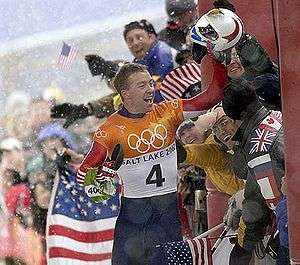Skeleton at the 2002 Winter Olympics
Skeleton returned to the program of the Winter Olympic Games for the first time in 54 years at the 2002 Games in Salt Lake City, Utah. This was the first time Olympic competitions in skeleton were held during an Olympics outside of St. Moritz. Both men and women competed, with medals awarded after five runs down the course. Both events were contested on February 20.
| Skeleton at the XIX Olympic Winter Games | |
|---|---|
 Skeleton gold medalist Jimmy Shea Jr. at the 2002 Winter Olympics | |
| Venue | Utah Olympic Park |
| Dates | February 20 |
| Competitors | 39 from 19 nations |
| Skeleton at the 2002 Winter Olympics | ||
|---|---|---|
 | ||
| men | women | |
Medal summary
| Event | Gold | Silver | Bronze |
|---|---|---|---|
| Men's |
Jim Shea Jr. |
Martin Rettl |
Gregor Stähli |
| Women's |
Tristan Gale |
Lea Ann Parsley |
Alex Coomber |
Medal table
| Rank | Nation | Gold | Silver | Bronze | Total |
|---|---|---|---|---|---|
| 1 | 2 | 1 | 0 | 3 | |
| 2 | 0 | 1 | 0 | 1 | |
| 3 | 0 | 0 | 1 | 1 | |
| 0 | 0 | 1 | 1 | ||
| Totals (4 nations) | 2 | 2 | 2 | 6 | |
gollark: I don't know much about old CC versions but they're generally backward-compatible for programs.
gollark: Oh dear, that looks like a CC internal problem.
gollark: <@215232595070418944> If you want it to work on older versions, it may just let you specify the host header if you use the other form which allows adding custom headers.
gollark: Although maybe it would be better to make it automatically turn on when the buffer empties a bit.
gollark: I'm not sure how you got that from "prioritize a function" but, er, just make it wait for a touch event on the screen after shutting it down, I suppose.
This article is issued from Wikipedia. The text is licensed under Creative Commons - Attribution - Sharealike. Additional terms may apply for the media files.